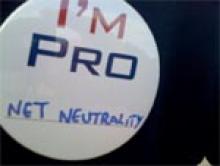The Short Memory of Network Neutrality Sell-Outs
Today, the FCC is poised to pass a half-ass attempt to preserve the open Internet against the interests of massive gatekeepers like AT&T and Comcast. Tim Karr rightly calls it Obama's "Mission Accomplished" moment.
Fortunately, the likely result will be a couple of years in the courts before the rule is thrown out because the FCC has not properly ground its half-ass actions in any authority it has received from Congress. Perhaps when the FCC next has to deal with this, we'll have an FCC Chairperson with a backbone and a stronger interest in what is best for hundreds of millions of Americans than what is best for AT&T and a few other corporations.
The FCC and supporters of this let's-keep-the-Internet-partly-open "compromise" will lump all critics as being extremist looneys. (Okay, the Republicans who oppose this might fit that description as they are literally making things up or totally confused about what is being decided).
But let's look at the crazy looney rhetoric of FCC Chair Genachowski last year:
Genachowski proposed that the FCC formalize its four principles of network openness. To encourage broadband deployment and preserve and promote the open and interconnected nature of the public Internet, consumers are entitled:To these, Genachowski proposed adding two more: The first would prevent Internet access providers from discriminating against particular Internet content or applications, while allowing for reasonable network management.
- to access the lawful Internet content of their choice.
- to run applications and use services of their choice, subject to the needs of law enforcement.
- to connect their choice of legal devices that do not harm the network.
- to competition among network providers, application and service providers, and content providers.



